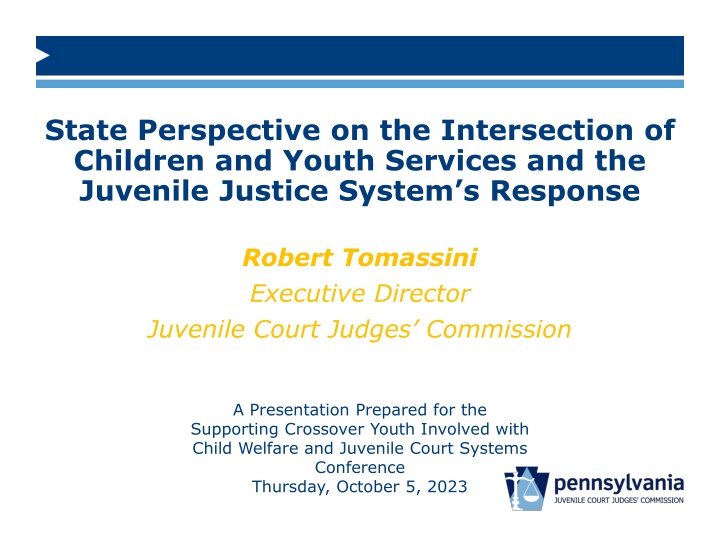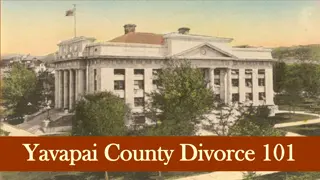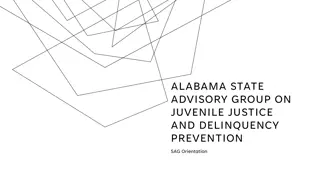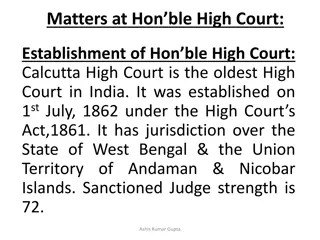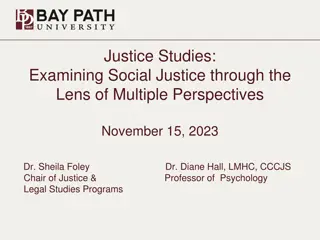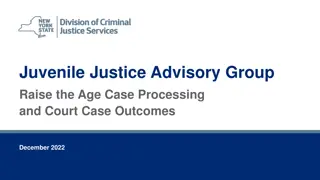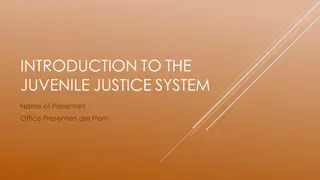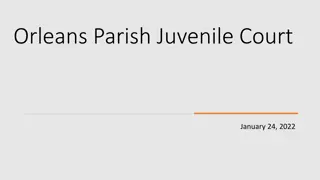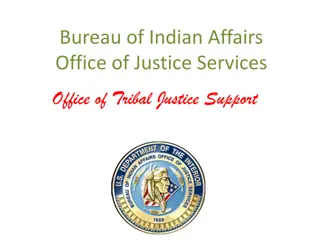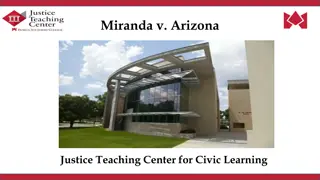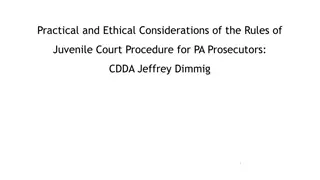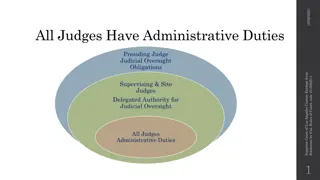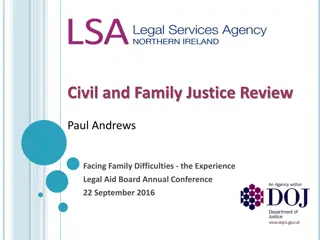Juvenile Court Judges Commission: Enhancing Pennsylvania's Juvenile Justice System
The Juvenile Court Judges Commission in Pennsylvania, comprising nine judges appointed by the Governor, plays a crucial role in providing leadership, advice, and support to improve the state's juvenile justice system. Their mission is focused on community protection, offender accountability, victim restoration, and youth competency development. Legislatively empowered, the commission advises on matters related to delinquent and dependent children's care, emphasizing evidence-based practices for efficient court administration.
Download Presentation

Please find below an Image/Link to download the presentation.
The content on the website is provided AS IS for your information and personal use only. It may not be sold, licensed, or shared on other websites without obtaining consent from the author.If you encounter any issues during the download, it is possible that the publisher has removed the file from their server.
You are allowed to download the files provided on this website for personal or commercial use, subject to the condition that they are used lawfully. All files are the property of their respective owners.
The content on the website is provided AS IS for your information and personal use only. It may not be sold, licensed, or shared on other websites without obtaining consent from the author.
E N D
Presentation Transcript
State Perspective on the Intersection of Children and Youth Services and the Juvenile Justice System s Response Robert Tomassini Executive Director Juvenile Court Judges Commission A Presentation Prepared for the Supporting Crossover Youth Involved with Child Welfare and Juvenile Court Systems Conference Thursday, October 5, 2023
Key System Partners Juvenile Court Judges Commission Pennsylvania Commission on Crime and Delinquency including their Juvenile Justice and Delinquency Prevention Committee Department of Human Services - Office of Children, Youth, and Families Administrative Office of Pennsylvania Courts - Office of Children and Families in the Courts. Juvenile Court Section of the Pennsylvania Conference of State Trial Judges Pennsylvania Council of Chief Juvenile Probation Officers County Juvenile Court and Probation Departments Service Provider Organizations and Agencies School Districts and Community Organizations
Juvenile Court Judges Commission Comprised of 9 juvenile court judges appointed by the Governor following nomination by the Chief Justice. Current members include: Executive Branch agency, created in 1959 Judge David R. Workman, Chair (Lancaster County) Judge Stephen P.B. Minor, Vice-Chair (Potter County) Judge Mitchell P. Shahen, Secretary (Beaver County) Judge Michele G. Bononi (Westmoreland County) Judge J. Brian Johnson (Lehigh County) Judge Jennifer McCrady (Allegheny County) Judge Margaret T. Murphy (Philadelphia County) Judge Royce L. Morris (Dauphin County) Judge Walter J. Olszewski (Philadelphia County) Located in the Governor s Office of General Counsel
Juvenile Court Judges Commission The mission of the Juvenile Court Judges Commission is to provide the leadership, advice, training and support to enable Pennsylvania s juvenile justice system to achieve its goals related to community protection, offender accountability, restoration of crime victims, and youth competency development.
Juvenile Court Judges Commission Legislatively empowered (42 Pa.C.S. 6373) to advise juvenile court judges in all matters pertaining to the proper care and maintenance of delinquent and dependent children, employing evidence- based practices whenever possible, and to compile and publish such statistical data as needed for efficient administration of the juvenile courts.
JCJC Mandates - 42 Pa.C.S. 6373 Advise juvenile court judges on all matters pertaining to the proper care and maintenance of delinquent and dependent children. Advise Examine the administrative methods and judicial procedure used in juvenile courts throughout the Commonwealth. Examine Examine the personnel practices and employment standards used in probation offices in the Commonwealth. Examine Establish standards and make recommendations on the same to courts presiding over juvenile proceedings within the Commonwealth. Establish Collect and analyze data to identify trends and to determine the effectiveness of programs and practices. Collect & Analyze Make recommendations concerning evidence-based programs and practices to the judges, the Administrative Office of the Pennsylvania Courts and other appropriate entities. Make Recommendations
Juvenile Court Judges Commission Priorities Continued advancement of Pennsylvania s Juvenile Justice System Enhancement Strategy (JJSES) Employing evidence-based practices, with fidelity, at every stage of the juvenile justice process; Collecting and analyzing the data necessary to measure the results of these efforts; and, with this knowledge, Striving to continuously improve the quality of our decisions, services and programs Reduce Racial and Ethnic Disparities Diverting low-risk youth whenever appropriate Increase community capacity Promote and advance dual status/crossover youth models
Central Substantive Law, Procedural Laws, & Standards The Juvenile Act The Act a comprehensive framework in which the juvenile courts can operate fairly, yet with a degree of flexibility and informality. Among its express purposes is to remove from children committing delinquent acts the consequences of criminal behavior, and to substitute therefor a program of supervision, care, and rehabilitation. The Rules of Juvenile Court Procedure The Rules of Juvenile Court Procedure shall govern delinquency proceedings in all courts. Unless otherwise specifically provided, these rules shall not apply to domestic relations proceedings and dependency proceedings. Juvenile Court Standards Each JCJC Standard outlines the requirements for effective policy and practice in a specific area of the juvenile justice system. Juvenile Justice and Delinquency Prevention (JJDP) Act Landmark legislation established OJJDP to support local and state efforts to prevent delinquency and improve juvenile justice systems.
Interagency Information Sharing Purpose of Pennsylvania s Juvenile Justice System under an informal adjustment or consent decree, who has been found to have committed a delinquent act or who has been found to be dependent or delinquent shall be provided, upon request, to the county agency, court or juvenile probation department, under and except as prohibited .. 6352.2. Interagency information sharing. General rule.--The contents of county agency, juvenile probation department, drug and alcohol, mental health and education records regarding a child who is the subject of an open child protective services or general protective services investigation, who is alleged to be dependent, who has been accepted for service by a county agency, who has been placed under supervision
Interagency Information Sharing (cont.) The information contained in the records may, notwithstanding any other provision of law, be shared among authorized representatives of the county agency, court and juvenile probation department. Purpose of Pennsylvania s Juvenile Justice System purposes set forth under this section under an interagency information-sharing agreement. The information shall be shared for the limited
Interagency Information Sharing Agreements Purpose of Pennsylvania s Juvenile Justice System being supervised under an informal adjustment or a consent decree, who have been found to have committed a delinquent act or who have been found to be dependent or delinquent, to enhance the coordination of efforts to identify children who may be at risk of child abuse, parental neglect or initial or additional delinquent behavior and to provide services to these children and their families. Subject to approval of the court and the requirements of this chapter and the statutes and regulations, an interagency information-sharing agreement may be developed in each county among the county agency, juvenile probation department, local law enforcement agencies, mental health agencies, drug and alcohol agencies, local school districts and other agencies and entities as deemed appropriate, to enhance the coordination of case management services to and the supervision of children who have been accepted for service by a county agency, who are
Interagency Information Sharing Agreements (cont.) Purpose of Pennsylvania s Juvenile Justice System person has been provided a full understanding of the circumstances under which and with whom the information will be shared. Whenever possible, the preferred method for obtaining authorization to share confidential information shall be upon the written, informed consent of the person authorized under applicable law to consent to the release of information after that
Dual Status Programs and Efforts - National RFK National Resource Center for Juvenile Justice Dual Status Youth Reform The RFK National Resource Center provides guidance for state and local jurisdictions in their endeavor to improve the outcomes for dual status youth (DSY) and families and to enhance system performance among the critical youth- and family-serving agency partners. The work is advanced by several publications that delve into research, best practice, and frameworks that can be applied by jurisdictions seeking to improve outcomes for dual status youth. Georgetown University Center for Juvenile Justice Reform Crossover Youth Practice Model The Crossover Youth Practice Model is a nexus between research and best practices that outlines systemic changes youth serving systems can make to improve their ability to serve youth.
Dual Status Programs and Efforts - Local Local Children s Roundtables (LCR) The LCR is convened by the county dependency judge and co-facilitated by the county children and youth administrator and is comprised of relevant stakeholders in the dependency system. The LCRs meet on a regular basis to share best or promising practices, address areas of concern within the county s dependency system and make plans to overcome barriers to timely permanency for children in their judicial district. Criminal Justice Advisory Boards (CJAB) County Criminal Justice Advisory Boards (CJABs) are local planning and problem- solving groups. Improved analysis of problems that will then result in better decisions. - Increased communication, cooperation, and coordination among police, courts, corrections, and private service agencies, as well as between levels of government. - More effective allocation of resources. - Higher quality programs and services based on a clear understanding of needs. - Expanded capacity and personnel skills. - Consolidated effort to make the justice system more cost-efficient, more accountable, and more open to the public. - Increased public confidence and involvement in the justice system.
Key Challenges Limited Understanding of Systems Lack of Collaboration Between Systems Data Lack of Resources
Key Takeaways Information Sharing/ Identifying Dual Status Youth Interagency Collaboration Judicial Leadership Case Planning and Management Data Collection and Analysis Training Developing and Committing Resources
Pennsylvanias Juvenile Justice System Reform Initiatives MacArthur Foundation s Models for Change initiative (2005-2010) Aftercare Mental Health / Juvenile Justice-Involved Youth Disproportionate Minority Contact Annie E. Casey Foundation s Juvenile Detention Alternatives Initiative (2011) Juvenile Detention Risk Assessment Instrument Center for Juvenile Justice Reform at Georgetown University (2011) Standardized Program Evaluation Protocol (SPEP) Serious, Chronic and Violent Offender Recidivism Analysis Council of State Governments (2014) Positioning Juvenile Justice Systems to Track and Use Data on Recidivism and Other Youth Outcomes Pilot Project Office of Juvenile Justice & Delinquency Prevention (OJJDP) (current) Second Chance Act Demonstration Project Council on Reform Governor Wolf (2019) Interbranch Juvenile Justice Task Force (2020) Georgetown University s Center for Juvenile Justice Reform (2021)
Bob Tomassini rtomassini@pa.gov Juvenile Court Judges Commission www.jcjc.pa.gov
